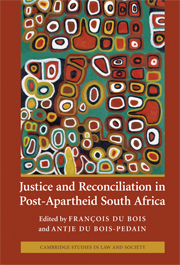Book contents
- Frontmatter
- Contents
- List of tables and figures
- List of contributors
- Acknowledgements
- List of abbreviations
- Introduction
- 1 Reconciliation as surrender: configurations of responsibility and memory
- 2 Radical forgiveness: transforming traumatic memory beyond Hannah Arendt
- 3 Communicating criminal and political responsibility in the TRC process
- 4 The contribution of criminal justice
- 5 Reparation and the forms of justice
- 6 Land restitution and reconciliation in South Africa
- 7 For justice and reconciliation to come: the TRC archive, big business and the demand for material reparations
- 8 Transition, forgiveness and citizenship: the TRC and the social construction of forgiveness
- 9 The evolving legitimacy of the South African Constitutional Court
- 10 Drawing the line: justice and the art of reconciliation
- 11 Post-conflict justice and the reconciliatory paradigm: the South African experience
- Index
- References
8 - Transition, forgiveness and citizenship: the TRC and the social construction of forgiveness
Published online by Cambridge University Press: 01 July 2009
- Frontmatter
- Contents
- List of tables and figures
- List of contributors
- Acknowledgements
- List of abbreviations
- Introduction
- 1 Reconciliation as surrender: configurations of responsibility and memory
- 2 Radical forgiveness: transforming traumatic memory beyond Hannah Arendt
- 3 Communicating criminal and political responsibility in the TRC process
- 4 The contribution of criminal justice
- 5 Reparation and the forms of justice
- 6 Land restitution and reconciliation in South Africa
- 7 For justice and reconciliation to come: the TRC archive, big business and the demand for material reparations
- 8 Transition, forgiveness and citizenship: the TRC and the social construction of forgiveness
- 9 The evolving legitimacy of the South African Constitutional Court
- 10 Drawing the line: justice and the art of reconciliation
- 11 Post-conflict justice and the reconciliatory paradigm: the South African experience
- Index
- References
Summary
INTRODUCTION
The function of forgiveness as a tool of governance can easily be overlooked. Yet, it always serves to articulate a culturally specific discourse about right and wrong, about victims and perpetrators, and about what should be done for social relations to begin, endure or improve. It is a discourse about what victims should do, what is expected from perpetrators, and the nature and function of the state and other institutions in the social world. In transitional, post-trauma societies, forgiveness has emerged as a discourse meant to open a new world, where both victims and perpetrators can coexist. In that context, forgiveness (re)distributes power.
Socio-political analyses of the meanings and uses of forgiveness are rare. What literature there is consists primarily of either psychological research, or philosophical, theological or legal exploration. Empirical content is minimal, if present at all. Clinical studies tend to present forgiveness as a therapeutic resolution to various mental states deemed to be pathological (anger, confusion, fear, etc.). Everywhere the positive, desirable nature of forgiveness is axiomatic. It is also simply assumed that forgiveness is difficult. Further, this difficulty is thought to be proportional to the severity of the harm to be forgiven. Forgiveness is seldom, if ever, thought of as having a political or governance face. The assumptions outweigh the empirical evidence.
In this chapter, we explore the use of forgiveness as a tool of governance, by considering its conceptual position within the South African Truth and Reconciliation Commission (TRC).
- Type
- Chapter
- Information
- Justice and Reconciliation in Post-Apartheid South Africa , pp. 206 - 228Publisher: Cambridge University PressPrint publication year: 2009



